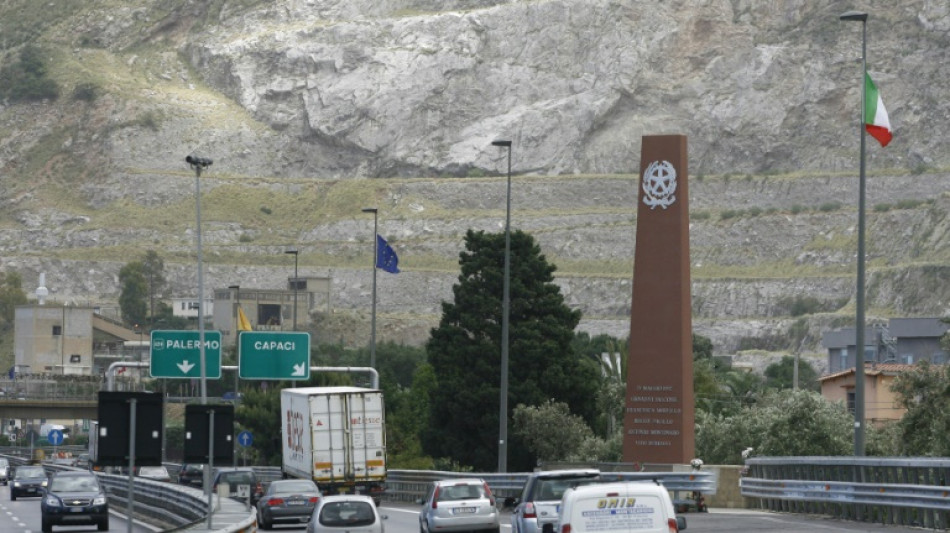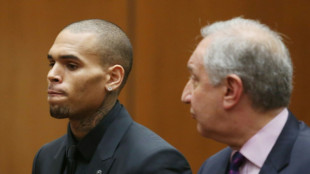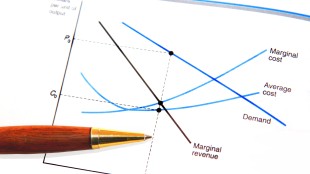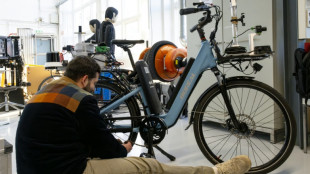
-
 Between laughs and 'disaster', Trump divides Davos
Between laughs and 'disaster', Trump divides Davos
-
Hundreds of people protest ahead of Swiss Davos meeting

-
 US falling behind on wind power, think tank warns
US falling behind on wind power, think tank warns
-
US news giant CNN eyes 200 job cuts, streaming overhaul

-
 Rubio chooses Central America for first trip amid Panama Canal pressure
Rubio chooses Central America for first trip amid Panama Canal pressure
-
Wall Street's AI-fuelled rally falters, oil slumps

-
 Trump tells Davos elites: produce in US or pay tariffs
Trump tells Davos elites: produce in US or pay tariffs
-
Progressive politics and nepo 'babies': five Oscar takeaways

-
 American Airlines shares fall on lackluster 2025 profit outlook
American Airlines shares fall on lackluster 2025 profit outlook
-
France to introduce new sex education guidelines in schools

-
 Wall Street's AI-fuelled rally falters
Wall Street's AI-fuelled rally falters
-
Drinking water in many French cities contaminated: study

-
 After Musk gesture, activists project 'Heil' on Tesla plant
After Musk gesture, activists project 'Heil' on Tesla plant
-
ICC prosecutor seeks arrest of Taliban leaders over persecution of women

-
 Syria's economy reborn after being freed from Assad
Syria's economy reborn after being freed from Assad
-
Shoppers unaware as Roman tower lurks under French supermarket

-
 Stocks mainly rise after Wall Street's AI-fuelled rally
Stocks mainly rise after Wall Street's AI-fuelled rally
-
Singer Chris Brown sues Warner Bros for $500 mn over documentary

-
 J-pop star Nakai to retire after sexual misconduct allegations
J-pop star Nakai to retire after sexual misconduct allegations
-
Leaky, crowded and hot: Louvre boss slams her own museum

-
 WWF blasts Sweden, Finland over logging practices
WWF blasts Sweden, Finland over logging practices
-
How things stand in China-US trade tensions with Trump 2.0

-
 Most Asian markets rise after Wall Street's AI-fuelled rally
Most Asian markets rise after Wall Street's AI-fuelled rally
-
Fire-hit Hollywood awaits Oscar nominees, with 'Emilia Perez' in front

-
 New rider in town: Somalia's first woman equestrian turns heads
New rider in town: Somalia's first woman equestrian turns heads
-
Most Asian markets extend AI-fuelled rally

-
 Bangladesh student revolutionaries' dreams dented by joblessness
Bangladesh student revolutionaries' dreams dented by joblessness
-
Larry Ellison, tech's original maverick, makes Trump era return

-
 Political crisis hits South Korea growth: central bank
Political crisis hits South Korea growth: central bank
-
Photonis Launches Two Market-Leading Solutions to Advance Single Photon Detection and Imaging Applications

-
 Les Paul owned by guitar god Jeff Beck auctioned for over £1 mn
Les Paul owned by guitar god Jeff Beck auctioned for over £1 mn
-
Musk bashes Trump-backed AI mega project

-
 Does China control the Panama Canal, as Trump claims?
Does China control the Panama Canal, as Trump claims?
-
Yemen's Huthis say freed detained ship's crew after Gaza truce

-
 Mel B, Trump and Milei: What happened at Davos Wednesday
Mel B, Trump and Milei: What happened at Davos Wednesday
-
Argentina's Milei says would leave Mercosur for US trade deal

-
 Fashion world 'afraid' of Trump, says Van Beirendonck
Fashion world 'afraid' of Trump, says Van Beirendonck
-
P&G sees China improvement but consumers 'still struggling'

-
 Stock markets mostly higher as they track Trump plans, earnings
Stock markets mostly higher as they track Trump plans, earnings
-
Anti-Semitic acts at 'historic' highs in France despite 2024 fall: council

-
 Trump's meme coin venture sparks backlash
Trump's meme coin venture sparks backlash
-
Global green energy push likely to continue despite Trump climate retreat: UN

-
 Prince Harry settles lawsuit against Murdoch's UK tabloids
Prince Harry settles lawsuit against Murdoch's UK tabloids
-
Stock markets diverge tracking Trump plans

-
 Sudan 'political' banknote switch causes cash crunch
Sudan 'political' banknote switch causes cash crunch
-
Masa Son, Trump's Japanese buddy with the Midas Touch

-
 Borussia Dortmund sack coach Nuri Sahin after Champions League setback
Borussia Dortmund sack coach Nuri Sahin after Champions League setback
-
'Love for humanity': Low-crime Japan's unpaid parole officers

-
 Brazil saw 79% jump in area burned by fires in 2024: monitor
Brazil saw 79% jump in area burned by fires in 2024: monitor
-
No home, no insurance: The double hit from Los Angeles fires


How Italy's car-bombed judges shaped fight against mafia
"It was war and we all felt called up. No-one could afford to look away any longer," says Marzia Sabella, remembering the assassination of anti-mafia judge Giovanni Falcone 30 years ago.
Falcone was killed with his wife and bodyguards in a car bombing in Sicily on May 23, 1992, in one of Italy's most infamous murders.
His death at the hands of Cosa Nostra and that two months later of fellow prosecuting magistrate Paolo Borsellino marked a sea change in the fight against organised crime.
It also inspired a new generation of anti-mafia crusaders who, decades on, risk their own lives daily to carry on Falcone and Borsellino's fight.
Sabella, then 27, was training to become a notary but after the massacre in Capaci, a small town in the province of Palermo, "I suddenly swerved off course towards Palermo's prosecutors' office", she told AFP.
"I have never regretted it," said Sabella, who would go on to be the sole female prosecutor in the investigative team which in 2006 captured mafioso Bernardo Provenzano -- nicknamed "The Tractor" for the way he mowed down enemies.
The deaths of Falcone and Borsellino deaths stunned the country and resulted in tough new anti-mafia laws.
The judges were attributed with revolutionising the understanding of the mafia, working closely with the first informants and compiling evidence to prosecute hundreds of mobsters at the end of the 1980s in a groundbreaking Maxi Trial.
"Thanks to Falcone and Borsellino, the Sicilian Mafia became a notorious fact, not something that had to be proved to exist at every trial," Sabella said.
- Guarded 24/7 -
Judge Roberto Di Bella -- who obtained his first posting the day before Borsellino and his police escort were blown to pieces on July 19, 1992 -- said the murders "prompted nationwide protests... and a decisive cultural change".
Di Bella has spent much of his career trying to save at-risk children from being drawn into Italy's wealthy 'Ndrangheta crime group in Calabria, considered today to be much more powerful than its Sicilian rival.
The 58-year-old, now a judge at the juvenile court in Catania, was assigned an armed escort in 2016 after threats to his life, "which was very difficult, particularly at the start".
"It started at a low level, then bit by bit it increased to an armoured car, and now I have the police accompanying me everywhere I go," says Di Bella, whose magistrate wife "has had to get used to" a home life under armed guard.
It is a sacrifice many have to make. According to the most recent figures from the interior ministry, some 274 magistrates were under police protection in Italy in 2019.
"You no longer have a private life and your freedom is seriously compromised," Sabella said.
"But you get used to it and, after a while, the escort becomes part of your family."
- Institutional distancing -
Falcone is today a national hero, but in life was accused of attention-seeking and criticised by politicians and fellow magistrates, who both consistently underestimated the power of the mafia.
"Falcone knew he wasn't understood. Even the failed Adduara attack on him was believed to have been staged, including by those in his circle," Sabella said about a thwarted 1989 assassination attempt on Palermo's coast.
The mob felt able to target Falcone because he was perceived to be isolated after being snubbed for the post of chief magistrate in Palermo in 1988, according to judges, who warn of repeating the same mistakes today.
Those concerns prompted a backlash this month over the failure to name Nicola Gratteri, Italy's foremost 'Ndrangheta combatant, as national chief anti-mafia prosecutor.
Choosing someone else "would come across as a dangerous institutional distancing from such an exposed magistrate in the eyes of the mafia", judge Nino Di Matteo argued before the vote.
It risked creating "the conditions for isolation, the most fertile ground for murders and massacres", he warned.
Giovanni Melillo, an institutional favourite from Foggia, home to Italy's fourth largest mafia, was picked instead.
- Bodies in the streets -
Security services have reportedly just stumbled across fresh plans to assassinate Gratteri, who has been under police guard for 30 years.
Amid fears that not enough is being done, a trade union called last week for a "civilian escort" to help protect and support him.
Falcone's murder was just one of a string of deadly attacks which abruptly stopped in 1993.
Since then, the Cosa Nostra has been hit repeatedly by mass arrests -- but though it has lost much of its power, it is far from vanquished.
And while investigators concentrated on Sicily, other underworld groups flourished.
Sabella compared the mafia to coronavirus: "If you drop your guard it spreads like before or worse than before.
"If we dropped our guard even for just one month, we'd have to start all over again, collecting the dead from the streets."
O.Ignatyev--CPN



